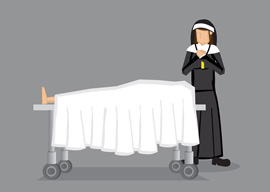
September 09, 2016

Source: Bigstock
It’s reading once again the last diary of my old friend, the playwright Simon Gray, that has got me brooding on death. This volume, Coda, is a record of his thoughts, feelings, and experiences after being diagnosed with lung cancer and confronted with the reality of imminent death. It’s brave, melancholy, and witty”he was one of the sharpest and funniest men I have known. At one time he contemplates the question of suicide, as many must do in such circumstances. “I can always kill myself as soon as I find that living is an agony, but how? is the question…how exactly does one kill oneself in a fashion that causes the least distress to those one loves”and the least inconvenience to many people that one doesn”t love, but has no right to inconvenience?” These are questions to which there is no satisfactory answer, and I suppose that people commit suicide only when they have reached a stage at which they no longer care what the answer might be. Ending the self is unavoidably a selfish act, and I suppose that if you don”t believe in God and divine punishment and all that, it’s imagining the distress and inconvenience you cause that serves as the principal deterrent. Simon didn”t kill himself. He argued himself out of the temptation, and indeed Coda ends happily, optimistically, with the cancer in remission and the doctors promising him two years more of life. I had a cheerful email from him giving me the news and then, characteristically, grumbling that he must now find a subject for a play to write. He never did. The next news I had was of his death”sudden, from a heart attack, not his cancer. That’s death’s way. Cheated in some fashion, it will nevertheless creep up on you.
Nowadays, of course, we”re in a real fix about death. No longer believing in the life everlasting, medical science, doctors, nurses, etc. combine and contrive to make this one last as long as possible, dragging out existence even when the patient has been reduced to a vegetable condition. I know nobody who doesn”t shrink from that prospect, and yet it confronts millions of us. “Why prolong life, save to prolong pleasure?” asked that tough old pagan Norman Douglas. A good question, and he answered it himself by taking an overdose when the prospect of pleasure seemed to have vanished. Unless you believe, like Hamlet, that “the Almighty has set his canon “gainst self-slaughter,” it seems a good way out, preferable to dragging out existence, mindless and incontinent, in a geriatric ward. Still, no matter how the end comes, the bell tolls for us all.